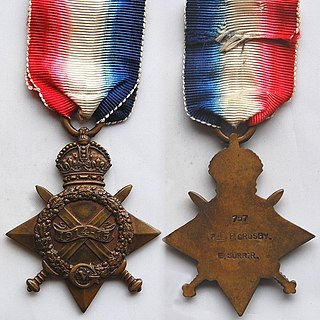 W
WThe 1914–15 Star is a campaign medal of the British Empire which was awarded to officers and men of British and Imperial forces who served in any theatre of the First World War against the Central European Powers during 1914 and 1915. The medal was never awarded singly and recipients also received the British War Medal and Victory Medal.
 W
WThe 1939–1945 Star is a military campaign medal instituted by the United Kingdom on 8 July 1943 for award to British and Commonwealth forces for service in the Second World War. Two clasps were instituted to be worn on the medal ribbon, Battle of Britain and Bomber Command.
 W
WThe Africa Service Medal is a South African campaign medal for service during the Second World War, awarded to members of the Union Defence Forces, the South African Police and the South African Railways Police. The medal was originally intended for service in Africa, but it was later extended to cover service anywhere in the world.
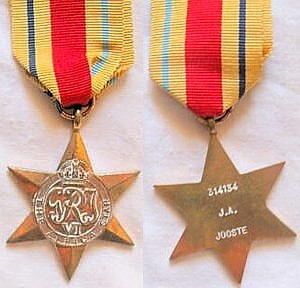 W
WThe Africa Star is a military campaign medal, instituted by the United Kingdom on 8 July 1943 for award to British and Commonwealth forces who served in North Africa between 10 June 1940 and 12 May 1943 during the Second World War.
 W
WThe Air Crew Europe Star is a military campaign medal, instituted by the United Kingdom in May 1945 for award to British and Commonwealth air crews who participated in operational flights over Europe from bases in the United Kingdom during the Second World War.
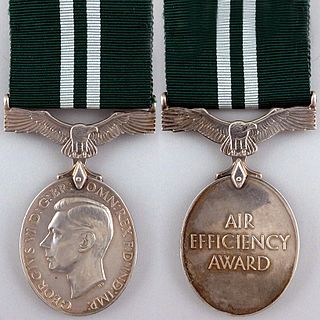 W
WThe Air Efficiency Award, post-nominal letters AE for officers, was instituted in 1942. It could be awarded after ten years of meritorious service to officers, airmen and airwomen in the Auxiliary and Volunteer Air Forces of the United Kingdom and the Territorial Air Forces and Air Force Reserves of the Dominions, the Indian Empire, Burma, the Colonies and Protectorates.
 W
WThe Arctic Star is a military campaign medal instituted by the United Kingdom on 19 December 2012 for award to British Commonwealth forces who served on the Arctic Convoys north of the Arctic Circle, during the Second World War.
 W
WIn May 1895, Queen Victoria authorised Colonial governments to adopt various British military medals and to award them to their local military forces. The Cape of Good Hope introduced this system in September 1895 and, in 1896, instituted the Army Long Service and Good Conduct Medal .
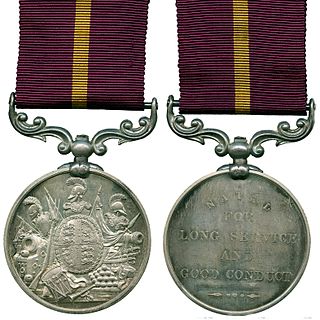 W
WIn May 1895, Queen Victoria authorised Colonial governments to adopt various British military medals and to award them to their local military forces. The Colony of Natal introduced this system in August 1895 and, in 1897, instituted the Army Long Service and Good Conduct Medal (Natal).
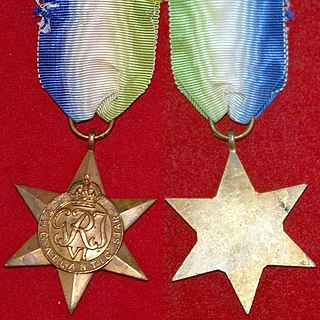 W
WThe Atlantic Star is a military campaign medal, instituted by the United Kingdom in May 1945 for award to British Commonwealth forces who took part in the Battle of the Atlantic, the longest continuous campaign of the Second World War.
 W
WThe British War Medal is a campaign medal of the United Kingdom which was awarded to officers and men of British and Imperial forces for service in the First World War. Two versions of the medal were produced. About 6.5 million were struck in silver and 110,000 in bronze, the latter awarded to, among others, the Chinese, Maltese and Indian Labour Corps.
 W
WThe Burma Star is a military campaign medal, instituted by the United Kingdom in May 1945 for award to British and Commonwealth forces who served in the Burma Campaign from 1941 to 1945, during the Second World War.
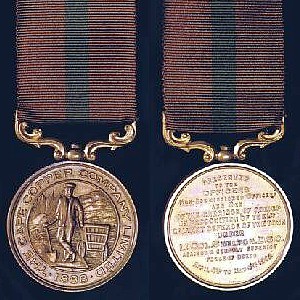 W
WIn the Colonies and Boer Republics which became the Union of South Africa in 1910, several unofficial military decorations and medals were instituted and awarded during the nineteenth and early twentieth century. The Cape Copper Company Medal for the Defence of O'okiep is a private campaign medal which was instituted by the Cape Copper Company Limited in 1902. The medal was awarded to members of the O'okiep Garrison who defended the town while it was besieged by Boer Commandos from 4 April to 4 May 1902, near the end of the Second Boer War.
 W
WThe Cape of Good Hope General Service Medal is a British campaign medal which was awarded to members of the Cape Colonial Forces who took part in three campaigns in and around the Cape of Good Hope, in Basutoland in 1880–1881, in Transkei in 1880–1881 and in Bechuanaland in 1896–1897.
 W
WThe Colonial Auxiliary Forces Long Service Medal was instituted by Queen Victoria in 1899 as a military long service award for part-time members of all ranks in any of the organized military forces of the British Colonies, Dependencies and Protectorates throughout the British Empire. The medal gradually superseded the Volunteer Long Service Medal for India and the Colonies in all these territories, with the exception of the Isle of Man, Bermuda and the Indian Empire.
 W
WThe Colonial Auxiliary Forces Officers' Decoration, post-nominal letters VD, was established in 1899 as recognition for long and meritorious service as a part-time commissioned officer in any of the organized military forces of the British Colonies, Dependencies and Protectorates. It superseded the Volunteer Officers' Decoration for India and the Colonies in all these territories, but not in the Indian Empire.
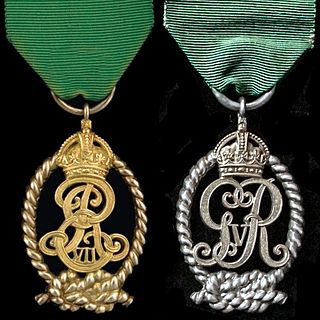 W
WThe Decoration for Officers of the Royal Naval Volunteer Reserve, post-nominal letters VD until c. 1947 and VRD thereafter, was instituted in 1908. It could be awarded to part-time commissioned officers in the United Kingdom's Royal Naval Volunteer Reserve after twenty years of service as efficient and thoroughly capable officers. The decoration was a Naval version of the Volunteer Officers' Decoration and its successor, the Territorial Decoration.
 W
WThe Defence Medal is a campaign medal instituted by the United Kingdom in May 1945, to be awarded to citizens of the British Commonwealth for both non-operational military and certain types of civilian war service during the Second World War.
 W
WThe Dekoratie voor Trouwe Dienst, post-nominal letters DTD, is a South African military decoration. It was instituted in 1920 as a retrospective award for Boer officers of the 1899–1902 Second Boer War.
 W
WThe Distinguished Conduct Medal, post-nominal letters DCM, was established in 1854 by Queen Victoria as a decoration for gallantry in the field by other ranks of the British Army. It is the oldest British award for gallantry and was a second level military decoration, ranking below the Victoria Cross, until its discontinuation in 1993 when it was replaced by the Conspicuous Gallantry Cross. The medal was also awarded to non-commissioned military personnel of other Commonwealth Dominions and Colonies.
 W
WIn 1895, Queen Victoria authorised Colonial governments to adopt various British military decorations and medals and to award them to their local military forces. The Colony of Natal introduced this system in August 1895 and, in 1897, instituted the Distinguished Conduct Medal (Natal), post-nominal letters DCM.
 W
WThe Efficiency Decoration , post-nominal letters ED, was instituted in 1930 for award to efficient and thoroughly capable part-time officers in the Citizen Force of the Union of South Africa after twenty years of service. The decoration superseded the Colonial Auxiliary Forces Officers' Decoration.
 W
WThe Efficiency Medal was instituted in 1930 for award to part-time warrant officers, non-commissioned officers and men after twelve years of efficient service on the active list of the Citizen Force of the Union of South Africa. At the same time, a clasp was instituted for award to holders of the medal upon completion of further periods of six years of efficient service. The medal superseded the Colonial Auxiliary Forces Long Service Medal.
 W
WThe France and Germany Star is a military campaign medal, instituted by the United Kingdom in May 1945 for award to British Commonwealth forces who served in France, Belgium, Luxembourg, the Netherlands or Germany and adjacent sea areas between 6 June 1944 and 8 May 1945, during the Second World War.
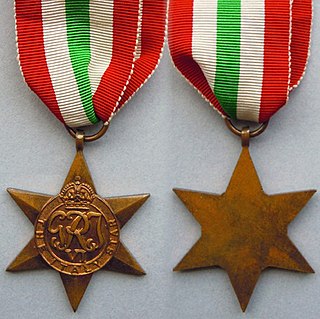 W
WThe Italy Star is a military campaign medal, instituted by the United Kingdom in May 1945 for award to British Commonwealth forces who served in the Italian Campaign from 1943 to 1945, during the Second World War.
 W
WIn the Colonies and Boer Republics which became the Union of South Africa in 1910, several unofficial military decorations and medals were instituted and awarded during the nineteenth and early twentieth century. The Johannesburg Vrijwilliger Corps Medal is an unofficial private campaign medal which was instituted in 1899 by Lieutenant Colonel S.H. van Diggelen, the founder and Commanding Officer of the Johannesburg Vrijwilliger Corps, for award to the officers and men of his unit.
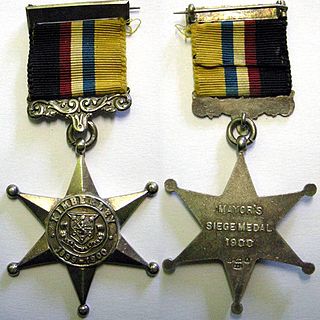 W
WIn the Colonies and Boer Republics which became the Union of South Africa in 1910, several unofficial military decorations and medals were instituted and awarded during the nineteenth and early twentieth century. The Kimberley Star is an unofficial private campaign medal which was instituted by the Mayor of Kimberley in 1900. The medal was awarded to all who took part in the defence of the diamond mining town during the four months in 1899 and 1900 while Kimberley was besieged by Boer Republican Forces during the Second Boer War.
 W
WThe King's South Africa Medal is a British campaign medal awarded to all British and Colonial military personnel who served in the Second Boer War in South Africa, and who were in the theatre on or after 1 January 1902 and who had completed 18 months service in the conflict prior to 1 June 1902.
 W
WThe Lint voor Verwonding is a South African military campaign award. It was instituted on 21 December 1920 as a retrospective award for Boer veteran officers and men of the 1899–1902 Second Boer War who had been wounded in action.
 W
WThe Medal for Long Service and Good Conduct is a distinctive South African version of the British Medal for Long Service and Good Conduct (Military). It was awarded to members of the Permanent Force of the Union of South Africa who had completed eighteen years of reckonable service.
 W
WThe Medalje voor de Anglo-Boere Oorlog is a South African military campaign medal. It was instituted on 21 December 1920 as a retrospective award for Boer veteran officers and men who fought in the 1899–1902 Second Boer War.
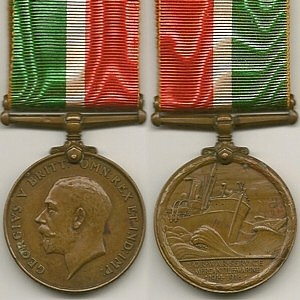 W
WThe Mercantile Marine War Medal was established in 1919 and awarded by the Board of Trade of the United Kingdom to mariners of the British Mercantile Marine for service at sea during the First World War.
 W
WIn May 1895, Queen Victoria authorised Colonial governments to adopt various British military medals and to award them to members of their local permanent military forces. The Cape of Good Hope introduced this system in September 1895 and, in 1896, instituted the Meritorious Service Medal .
 W
WIn May 1895, Queen Victoria authorised Colonial governments to adopt various British military medals and to award them to members of their local permanent military forces. The Colony of Natal introduced this system in August 1895 and, in 1897, instituted the Meritorious Service Medal (Natal).
 W
WIn May 1895, Queen Victoria authorised Colonial governments to adopt various British military medals and to award them to their local permanent military forces. The Cape of Good Hope and Colony of Natal instituted their own territorial versions of the Meritorious Service Medal in terms of this authority. These two medals remained in use in the respective territories until after the establishment of the Union of South Africa in 1910.
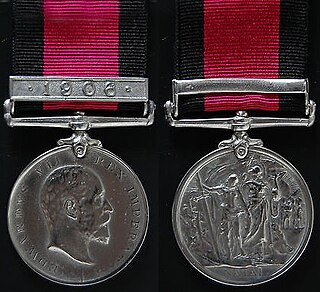 W
WThe Natal Native Rebellion Medal was a British campaign medal. It was authorised in 1907 for service in Natal during a Zulu revolt against British rule and taxation in 1906. The 1906 Clasp to the medal was awarded to those who had served for more than fifty days.
 W
WThe Pacific Star is a military campaign medal instituted by the United Kingdom in May 1945 for award to British and Commonwealth forces who served in the Pacific Campaign from 1941 to 1945, during the Second World War.
 W
WThe Permanent Forces of the Empire Beyond the Seas Medal is a long service and good conduct medal, instituted for award to other ranks of the Permanent Forces of the Dominions and Colonies of the British Empire. The medal, also known as the Permanent Overseas Forces Long Service and Good Conduct Medal, was established in 1910 as a single common award to supersede the several local versions of the Army Long Service and Good Conduct Medal which were being awarded by the various territories.
 W
WThe Medal for the Best Shot in the British Army, Infantry, was instituted by Queen Victoria in 1869 and was awarded annually from 1870 to 1882 to the best shot of the Infantry of the British Army, including the Royal Engineers and the Colonial Corps.
 W
WThe Queen's South Africa Medal is a British campaign medal awarded to British and Colonial military personnel, and to civilians employed in an official capacity, who served in the Second Boer War in South Africa. Altogether twenty-six clasps were awarded, to indicate participation in particular actions and campaigns.
 W
WThe Royal Naval Volunteer Reserve Long Service and Good Conduct Medal, initially designated the Royal Naval Volunteer Reserve Long Service Medal, was instituted in 1908. It could be awarded to part-time ratings in the United Kingdom's Royal Naval Volunteer Reserve after twelve years of service and good conduct. The medal was a Naval version of the Volunteer Long Service Medal and its successor, the Territorial Force Efficiency Medal.
 W
WIn the Colonies and former Boer Republics which became the Union of South Africa in 1910, several unofficial military decorations and medals were instituted and awarded during the nineteenth and early twentieth century. Sir Harry Smith's Medal for Gallantry is an unofficial military decoration for bravery, awarded for actions following the siege of Fort Cox in December 1850, at the beginning of the 8th Cape Frontier War. The medal was privately instituted in 1851 by Major General Sir Henry George Wakelyn Smith Bt GCB, at the time the Governor and Commander-in-Chief of the Cape of Good Hope.
 W
WThe South Africa Medal (1853) is a campaign medal instituted in 1854, for award to officers and men of the Royal Navy, British Army and locally recruited Cape Mounted Riflemen, who served in the Cape of Good Hope during the Xhosa Wars between 1834 and 1853.
 W
WThe South Africa Medal (1880), often referred to as the Zulu War Medal, is a campaign medal instituted in 1880 and awarded by the British Government to members of the British Army, Royal Naval Brigade and Colonial Volunteers who were involved in a series of South African tribal wars in the Cape of Good Hope, Colony of Natal and Transvaal between 1877 and 1879, most notably for the Anglo-Zulu War of 1879.
 W
WThe South African Medal for War Services is a South African service medal for voluntary unpaid service in support of the war effort between 6 September 1939 and 15 February 1946, during the Second World War.
 W
WThe Union of South Africa Commemoration Medal is a military and civil commemorative medal which was awarded to commemorate the opening of the first Union Parliament by the Duke of Connaught and Strathearn in 1910. It may be considered as the first of many independence medals which were instituted throughout the Commonwealth during the 20th century.
 W
WThe Victory Medal is the Union of South Africa's version of the Victory Medal , a First World War campaign medal of Britain and her colonies and dominions. The medal, never awarded singly, was awarded to all those South Africans who were awarded the 1914–15 Star or the British War Medal.
 W
WThe Volunteer Long Service Medal was instituted in 1894 as an award for long service by other ranks and some officers of the United Kingdom's Volunteer Force. In 1896, the grant of the medal was extended to other ranks and officers who had served in the ranks of the Volunteer Forces throughout the British Empire. A separate new medal was instituted, the Volunteer Long Service Medal for India and the Colonies. Awarding of this medal was discontinued in stages when it was superseded in most territories by the Colonial Auxiliary Forces Long Service Medal in 1899 and in the remainder by the Efficiency Medal in 1930.
 W
WThe Volunteer Officers' Decoration was instituted in 1892 as an award for long and meritorious service by officers of the United Kingdom's Volunteer Force. In 1894, the grant of the decoration was extended to commissioned officers of Volunteer Forces throughout the British Empire. A separate new decoration was instituted, the Volunteer Officers' Decoration for India and the Colonies, post-nominal letters VD.
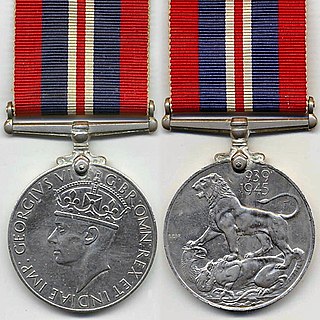 W
WThe War Medal 1939–1945 is a campaign medal which was instituted by the United Kingdom on 16 August 1945, for award to citizens of the British Commonwealth who had served full-time in the Armed Forces or the Merchant Navy for at least 28 days between 3 September 1939 and 2 September 1945.